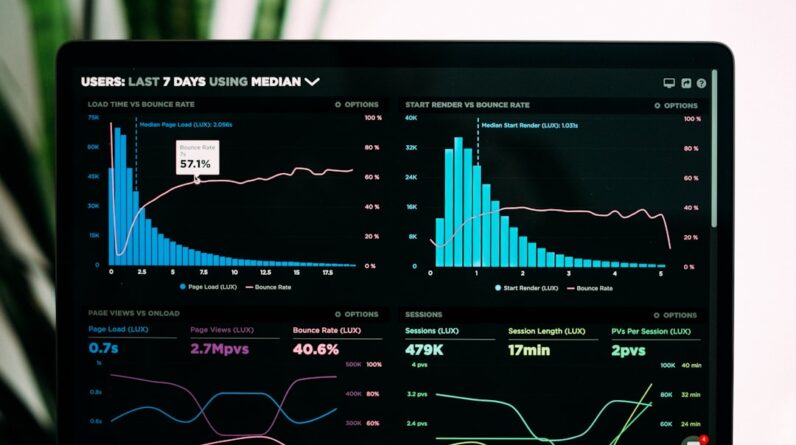As you navigate the ever-evolving landscape of finance, you may find yourself increasingly drawn to the transformative power of artificial intelligence (AI). This technology has emerged as a game-changer, reshaping how financial institutions operate and how individuals manage their investments. AI’s ability to analyze vast amounts of data at lightning speed allows for more informed decision-making, enhancing efficiency and accuracy in various financial processes.
From automating mundane tasks to providing deep insights into market trends, AI is revolutionizing the finance sector in ways that were once unimaginable. In this digital age, the integration of AI into finance is not merely a trend; it is a fundamental shift that is redefining the industry. You might be curious about how AI can enhance your financial strategies or improve the services offered by your bank.
As you delve deeper into this topic, you will discover that AI’s applications are vast and varied, impacting everything from stock market analysis to personalized financial advice. Understanding these developments will empower you to make better financial decisions and stay ahead in a competitive environment.
Key Takeaways
- AI is revolutionizing the finance industry by providing advanced tools for analysis, risk management, and personalized advice.
- AI has a significant impact on stock market analysis by processing large volumes of data and identifying patterns and trends that human analysts may miss.
- AI is being used in risk management and fraud detection to identify and mitigate potential risks and fraudulent activities in real time.
- AI is playing a crucial role in providing personalized financial advice by analyzing individual financial data and providing tailored recommendations.
- Algorithmic trading is being transformed by AI, allowing for faster and more accurate decision-making in buying and selling financial instruments.
The Impact of AI on Stock Market Analysis
Enhanced Investment Decisions
This capability allows investors to make more informed decisions based on predictive analytics rather than solely relying on past performance. Moreover, AI can process unstructured data, such as news articles and social media sentiment, which can significantly influence stock prices.
Uncovering Hidden Insights
By analyzing this information, AI systems can provide investors with insights that traditional analysis might overlook. For instance, if a particular company is facing negative press, an AI-driven tool can alert investors to potential risks before they impact stock performance.
Staying Ahead of Market Dynamics
This level of analysis not only enhances investors’ understanding of market dynamics but also equips them with the tools needed to respond swiftly to changing conditions.
AI in Risk Management and Fraud Detection
In the realm of risk management, AI plays a crucial role in identifying and mitigating potential threats. As you engage with financial institutions or manage your own investments, you may appreciate how AI systems can analyze vast datasets to detect anomalies that could indicate fraudulent activity. By employing advanced algorithms, these systems can flag unusual transactions or behaviors that deviate from established patterns, allowing for timely intervention.
Fraud detection is particularly vital in today’s digital landscape, where cyber threats are increasingly sophisticated. You might find comfort in knowing that AI can continuously learn from new data, improving its ability to recognize fraudulent activities over time. This adaptive learning process means that as fraudsters develop new tactics, AI systems can evolve to counteract these threats effectively.
Consequently, both individuals and institutions benefit from enhanced security measures that protect their financial assets.
The Role of AI in Personalized Financial Advice
As you seek financial guidance tailored to your unique circumstances, AI is stepping in to provide personalized advice like never before. Traditional financial advisors often rely on standardized models that may not fully account for your individual goals and risk tolerance. In contrast, AI-driven platforms can analyze your financial situation holistically, taking into consideration factors such as income, expenses, investment preferences, and long-term objectives.
These AI systems utilize algorithms to create customized investment strategies that align with your specific needs. For instance, if you’re saving for retirement or planning a major purchase, an AI tool can recommend investment options that suit your timeline and risk appetite. This level of personalization not only enhances your financial planning but also empowers you to make informed decisions that align with your aspirations.
As you explore these options, you’ll likely find that AI-driven advice is both accessible and actionable.
AI and Algorithmic Trading
Algorithmic trading represents one of the most significant advancements brought about by AI in the finance sector. If you’re an investor looking to capitalize on market opportunities quickly, algorithmic trading can be a powerful ally. By leveraging complex algorithms and high-frequency trading strategies, AI systems can execute trades at speeds far beyond human capabilities.
This allows you to take advantage of fleeting market conditions that may arise within seconds. Moreover, algorithmic trading is not just about speed; it also incorporates sophisticated analytics to optimize trading strategies. You may find it fascinating that these systems can analyze historical data and real-time market conditions simultaneously, enabling them to make split-second decisions based on a multitude of factors.
As a result, algorithmic trading can enhance your investment returns while minimizing risks associated with emotional decision-making. By relying on data-driven strategies, you can approach trading with greater confidence and precision.
AI in Economic Forecasting and Trend Analysis
Accurate Forecasting through Data Analysis
By analyzing variables such as employment rates, consumer spending patterns, and geopolitical events, AI systems can generate forecasts that help anticipate market movements. This capability enables businesses and investors to stay ahead of the curve and make informed decisions about their investments or strategies.
Uncovering Emerging Patterns
Trend analysis powered by AI can uncover emerging patterns that may not be immediately apparent through traditional methods. For instance, AI tools can provide valuable insights into shifts in consumer behavior or investment trends based on real-time data analysis.
Informed Decision-Making
The ability of AI to provide accurate forecasts and uncover emerging patterns enables businesses and investors to make informed decisions about their investments or strategies. By leveraging AI in economic forecasting and trend analysis, you can gain a competitive edge in the market and drive business growth.
Ethical and Regulatory Considerations in AI and Finance
As you explore the benefits of AI in finance, it’s essential to consider the ethical and regulatory implications that accompany this technology. The rapid adoption of AI raises questions about data privacy, algorithmic bias, and accountability. You may wonder how financial institutions ensure that their AI systems operate fairly and transparently while safeguarding sensitive information.
Regulatory bodies are increasingly scrutinizing the use of AI in finance to establish guidelines that protect consumers and maintain market integrity. As an informed participant in the financial landscape, it’s crucial for you to understand these regulations and their potential impact on your investments or financial decisions. By staying informed about ethical considerations surrounding AI, you can advocate for responsible practices within the industry while benefiting from the advancements this technology offers.
The Future of AI in Finance
Looking ahead, the future of AI in finance appears promising yet complex. As technology continues to evolve, you can expect even more innovative applications that enhance efficiency and decision-making across the industry. From improved customer service through chatbots to advanced predictive analytics for investment strategies, the possibilities are vast.
However, as you embrace these advancements, it’s essential to remain vigilant about the challenges they present. The integration of AI into finance will require ongoing collaboration between technologists, regulators, and industry professionals to ensure ethical practices are upheld while maximizing the benefits of this transformative technology. By staying engaged with these developments, you position yourself to navigate the future of finance with confidence and insight.
In conclusion, as you explore the intersection of AI and finance, you’ll discover a world rich with opportunities for growth and innovation. Understanding how these technologies impact various aspects of finance will empower you to make informed decisions that align with your goals while navigating an increasingly complex landscape. Embracing the potential of AI will not only enhance your financial acumen but also prepare you for the exciting future that lies ahead in this dynamic field.
In a recent article titled AI and Climate Modeling: Understanding and Mitigating Climate Change, the intersection of artificial intelligence and finance is explored in depth. This article delves into how AI can be used to analyze climate data and make predictions that can impact financial markets. It highlights the importance of leveraging advanced technologies to address pressing global issues like climate change, showcasing the potential for AI to not only revolutionize finance but also contribute to a more sustainable future.
FAQs
What is AI in finance?
AI in finance refers to the use of artificial intelligence technologies such as machine learning, natural language processing, and deep learning to analyze financial data, make predictions, automate processes, and provide personalized financial services.
How is AI used in the stock market?
AI is used in the stock market to analyze large volumes of financial data, identify patterns and trends, make predictions about stock prices, automate trading processes, and manage investment portfolios. AI algorithms can also be used to detect market anomalies and potential risks.
What are the benefits of using AI in finance?
The benefits of using AI in finance include improved accuracy in financial analysis and predictions, faster and more efficient trading processes, reduced human error, personalized financial services, and the ability to identify and mitigate risks in real time.
What are the potential risks of using AI in finance?
Potential risks of using AI in finance include algorithmic biases, data privacy and security concerns, overreliance on AI predictions, and the potential for market manipulation through AI-powered trading algorithms.
How is AI transforming the financial industry?
AI is transforming the financial industry by automating repetitive tasks, improving risk management, enhancing customer experience through personalized services, enabling faster and more accurate financial analysis, and creating new opportunities for investment and trading strategies.






